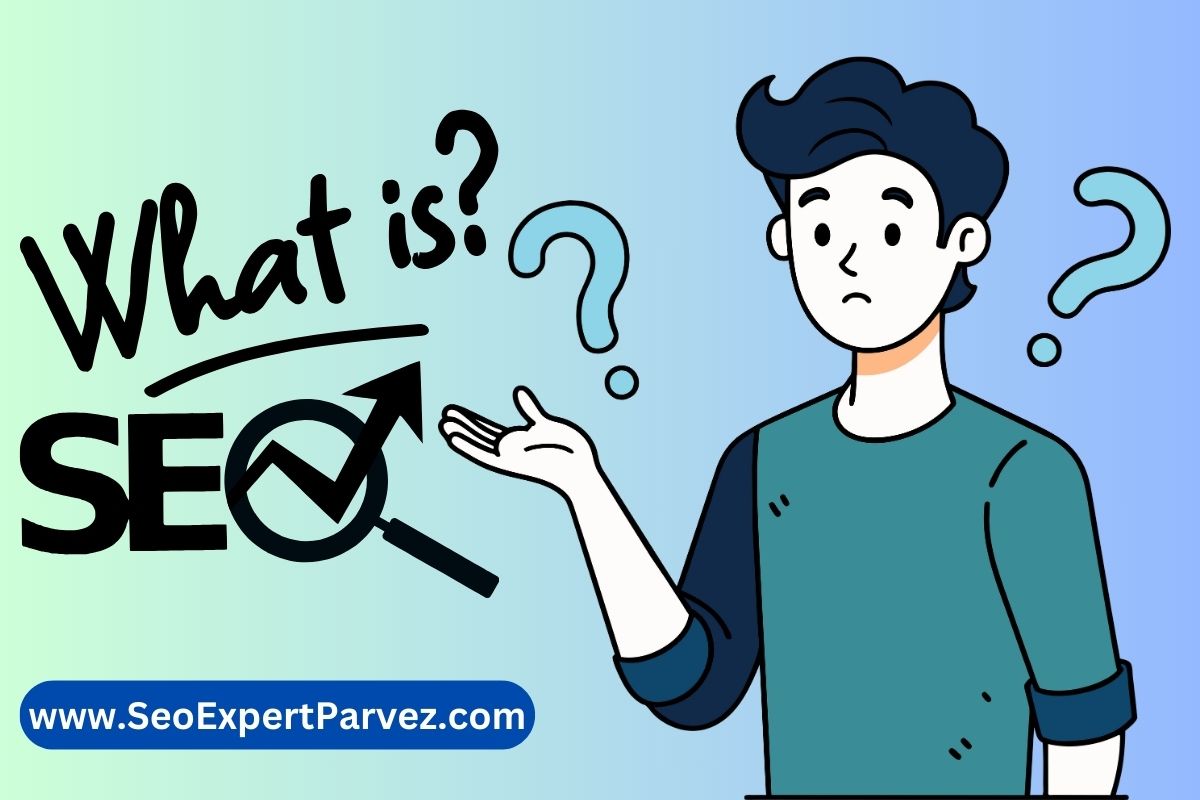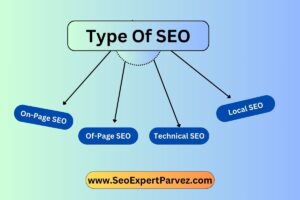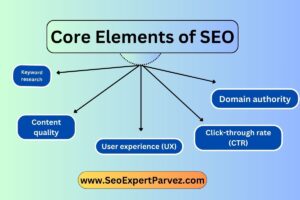
Search Engine Optimization, commonly known as SEO, is the process of enhancing a website’s visibility on search engines like Google, Bing, and Yahoo. It involves optimizing various aspects of a website to ensure it ranks higher in search results for relevant queries. The ultimate goal of SEO is to attract organic traffic by making the site more relevant and accessible to users and search engines alike.
Why SEO is important
SEO is crucial for businesses and websites as it helps them gain visibility in a highly competitive digital landscape. A well-optimized site ensures that users can easily find relevant information, products, or services, ultimately driving organic traffic.
Unlike paid ads, SEO provides long-term benefits by building trust and credibility with both search engines and users. It also improves user experience by making websites faster, mobile-friendly, and easy to navigate. As more people turn to search engines for answers, SEO becomes an essential strategy to connect with the right audience and achieve sustainable growth.
Types of SEO

SEO can be categorized into several types, each focusing on specific aspects of optimization to enhance a website’s performance. These include on-page SEO, which optimizes content and structure, off-page SEO,
which builds credibility through backlinks and external engagement, and technical SEO, which ensures a website’s technical framework supports search engine indexing. Together, these elements create a comprehensive strategy for improving search rankings and user experience.
On-Page SEO
On-page SEO refers to the process of refining individual web pages to ensure they are optimized for relevant keywords and user experience. This involves improving elements like content quality, meta descriptions, and headers to make the page both search engine-friendly and engaging for users. Effective on-page SEO plays a crucial role in increasing visibility and driving organic traffic.
Keyword research
Keyword research is essential for developing a strong SEO strategy. By identifying the search terms that are most relevant to your audience, you can tailor your content to meet their needs. This process involves using specialized tools to find keywords that have good search volume but not too much competition.
Once you identify these keywords, you should strategically incorporate them into your website’s content, titles, and meta tags to increase visibility. Proper keyword research ensures that your content resonates with the audience actively looking for your services or products.
Meta tags (Title, Meta Description)
Meta tags, including the title and meta description, are essential elements for SEO. The title tag is what appears in search engine results and should be concise, incorporating your main keywords. A well-crafted title not only improves rankings but also encourages users to click on your link.
Similarly, the meta description provides a brief overview of the page content and is often displayed under the title in search results. Although meta descriptions don’t directly impact rankings, they play a crucial role in enticing searchers to visit your page. A compelling meta description, paired with an optimized title, significantly enhances the click-through rate.
Heading tags (H1, H2, H3)
Heading tags (H1, H2, H3) help structure your content and make it easier for users to navigate. The H1 tag is the most important and typically contains the primary keyword for the page. It serves as the main heading and should describe the content accurately.
The H2 and H3 tags are subheadings that break down the content into logical sections, making it more digestible for readers. These tags also signal to search engines the hierarchy and relevance of the content, improving your SEO efforts. Proper use of heading tags ensures that both search engines and users can easily understand the structure and focus of your content.
Content optimization
Content optimization is the process of refining your website’s text to ensure it is engaging, informative, and aligned with SEO best practices. This involves adding relevant keywords in a natural way, improving readability, and ensuring the content answers users’ questions.
Optimized content should be clear, concise, and valuable to your audience, with a focus on delivering high-quality information that addresses their needs. Additionally, using a variety of content types, such as text, images, and videos, can enhance the user experience and increase the time visitors spend on your site, which can have a positive impact on SEO.
URL structure
It’s important to keep your URLs simple, clear, and informative. URLs should be easy for both users and search engines to understand. By using relevant keywords and ensuring the URL is concise, you make it easier for search engines to identify the page’s focus.
Avoid complicated URLs with unnecessary parameters, as they can confuse visitors and hurt your SEO rankings. A well-structured URL not only improves your site’s SEO but also makes it more user-friendly, enhancing overall navigation and sharing.
Image optimization
Optimizing images on your website is an often-overlooked aspect of SEO. Large image files can slow down your website’s loading time, which negatively impacts user experience and search rankings. To optimize images, ensure they are appropriately sized without compromising quality.
Additionally, using descriptive filenames and alt text with relevant keywords helps search engines understand the content of the image, improving your site’s visibility. Image optimization also makes your site more accessible, allowing visually impaired users to understand the content through screen readers.
Off-Page SEO
Off-page SEO involves activities that occur outside your website but still impact its search rankings. It focuses on gaining backlinks, promoting your content on social media, and building your online reputation.
Acquiring links from reputable websites can significantly enhance your site’s authority and boost its visibility. Additionally, social media interactions and brand mentions across the web can indirectly improve your site’s overall SEO performance by increasing exposure and trustworthiness.
Building backlinks
Building backlinks is a critical strategy in off-page SEO, as search engines consider them a vote of confidence from other websites. When authoritative sites link to your content, it signals to search engines that your site is trustworthy and relevant.
The quality of backlinks is more important than quantity; links from reputable sources hold greater value. By earning high-quality backlinks, you can improve your website’s visibility and credibility, ultimately boosting your search engine rankings.
Social media marketing
Social media marketing plays a significant role in enhancing your online presence and indirectly supporting SEO efforts. By sharing your content on platforms like Facebook, Twitter, and Instagram, you increase your brand visibility and drive traffic to your website.
While social media signals don’t directly influence search rankings, engaging with your audience and encouraging shares can lead to more organic backlinks and traffic, which can improve your SEO performance over time.
Guest blogging
Guest blogging is an excellent way to expand your reach and build relationships with other websites in your industry. By writing informative and relevant posts for other blogs, you can secure valuable backlinks and introduce your content to a new audience.
Guest blogging also helps establish your authority in your niche, as high-quality posts on reputable sites can boost your reputation. This strategy not only enhances SEO but also fosters collaboration and credibility within your field.
Forum Posting
Participating in online forums related to your industry is another effective method of off-page SEO. By contributing valuable insights and answering questions, you can establish yourself as an expert and build brand awareness.
Including a link to your website in your forum posts can drive targeted traffic and generate backlinks. However, it’s important to avoid spammy behavior and focus on providing genuine, helpful content that adds value to the conversation.
Technical SEO
Technical SEO involves optimizing the technical aspects of your website to improve its search engine rankings and overall user experience. This includes enhancing factors like website speed, mobile usability,
and site structure to ensure that search engines can crawl and index your pages effectively. By addressing these technical details, you help search engines understand your site better, which can lead to better visibility in search results.
Website speed optimization
Website speed optimization is crucial for both user experience and SEO. Slow-loading websites can frustrate visitors and increase bounce rates, negatively impacting your rankings. Improving site speed involves compressing images, reducing unnecessary code, and leveraging caching techniques.
The faster your website loads, the better the experience for users, which ultimately leads to better search engine rankings.
Mobile-friendly design
With the majority of web traffic coming from mobile devices, having a mobile-friendly design is no longer optional. Google uses mobile-first indexing, which means it prioritizes the mobile version of your website for ranking purposes. A responsive design ensures that your site adjusts to different screen sizes, providing an optimal viewing experience for users. A mobile-friendly site improves user engagement and can positively impact your SEO.
Sitemap creation
A sitemap is a vital tool that provides search engines with an overview of your website’s structure, helping them navigate and index your content more effectively. By submitting this file, you ensure that search engines can easily find and crawl all important pages on your site.
It acts as a roadmap for search engine bots, guiding them to discover and index content that may not be directly linked within the site’s navigation.
Robots.txt
The robots.txt file is an essential tool for controlling how search engine bots crawl and index your site. By using this file, you can specify which pages or sections of your website should be crawled or ignored.
This helps prevent search engines from indexing duplicate content or irrelevant pages, ensuring that only the most valuable content is prioritized. Proper management of the robots.txt file can improve your site’s crawl efficiency and overall SEO performance.
SSL certificate
An SSL certificate ensures that your website is secure by encrypting the data transmitted between your site and its users. Websites with HTTPS, signified by the SSL certificate, are trusted more by both users and search engines.
Google considers SSL as a ranking factor, so having an SSL certificate can positively affect your search rankings. Additionally, it builds trust with users, especially when they are entering sensitive information like passwords or payment details.
Local SEO
Local SEO is a strategy designed to improve your website’s visibility in local search results. This is especially important for businesses that serve a specific geographic area. By focusing on local search optimization, you can ensure that your business appears when potential customers search for services or products nearby. This type of SEO helps you attract more relevant traffic and connect with local customers.
Google My Business profile
Creating and optimizing a Google My Business (GMB) profile is one of the most effective ways to improve your local SEO. A complete and accurate GMB listing helps your business show up in local search results,
especially in Google’s local pack. By adding important details like your business hours, location, phone number, and services, you enhance your chances of being found by nearby customers. Encouraging customers to leave reviews on your GMB profile also boosts your credibility and local rankings.
Local directory listings
Listing your business in local online directories is another important aspect of local SEO. These directories serve as authoritative sources that help search engines understand more about your business.
Being listed in directories like Yelp, Yellow Pages, or local chambers of commerce increases your visibility and provides valuable backlinks, which can positively impact your search engine rankings. Ensure that your business details, such as name, address, and phone number, are consistent across all listings to improve your local SEO performance.
Local keyword optimization
Optimizing your content with local keywords is essential for targeting customers in your area. This involves incorporating location-based terms, such as the name of your city or neighborhood, into your website’s content, meta tags, and headings.
By using local keywords, you signal to search engines that your content is relevant to people searching for services in your geographic location. This helps ensure that you rank higher for local searches and are more likely to attract customers in your area.
Core Elements of SEO

SEO is made up of several key components that work together to improve your website’s rankings on search engines. These elements are essential for ensuring that your site is discoverable, offers valuable content, and provides a positive experience for users. By focusing on these core aspects, you can develop a strong SEO strategy that drives long-term success.
Keyword research
Keyword research is an essential step in crafting an effective SEO plan. It involves discovering the specific terms and queries that your target audience is using when looking for your services or products. By identifying these keywords.
you can tailor your content to match what users are searching for, making it easier for search engines to recognize your relevance to those queries. Proper keyword research ensures you’re targeting the right audience and optimizing content to meet their needs.
Content quality
The quality of your content is critical to SEO success. Search engines tend to favor content that is not only relevant and informative but also engaging and well-crafted. High-quality content addresses user needs, provides value, and encourages interactions such as shares or backlinks.
By focusing on providing in-depth and useful information, you improve your chances of ranking well and drawing more organic traffic to your site. Consistently producing top-tier content strengthens your website’s authority and boosts SEO over time.
User experience (UX)
User experience (UX) is a key contributor to SEO performance. A website that is easy to navigate and visually appealing can lead to longer visits and lower bounce rates. A good UX ensures that users can quickly find the information they are looking for which in turn leads to better engagement and increased chances of return visits.
Search engines reward sites that prioritize user-friendly experiences with higher rankings, as they aim to direct users to the most functional and accessible websites.
Click-through rate (CTR)
Click-through rate (CTR) is the percentage of users who click on your website after seeing it in search results. A higher CTR indicates that your title tags and meta descriptions are compelling and relevant to users’ searches.
Improving CTR can be achieved by writing engaging, clear, and concise meta descriptions and titles, as well as using structured data to enhance search result listings. A good CTR can lead to improved rankings, as search engines view it as a sign that your content is valuable to users.
Domain authority
Domain authority (DA) is a measure of a website’s credibility and potential to rank well in search engine results. It is determined by factors like the quality and quantity of backlinks, the website’s age, and its overall trustworthiness.
A higher DA indicates that your site is more authoritative in its field, which can make it easier for your content to rank higher for competitive terms. Building domain authority involves consistently earning quality backlinks and providing valuable content that boosts your site’s reputation over time.
SEO Strategies and Tips

To enhance your website’s visibility and drive more organic traffic, it’s essential to adopt effective SEO strategies. These strategies are designed to optimize various aspects of your website, from content and structure to external factors such as backlinks. By implementing the right techniques, you can improve your site’s rankings and attract the right audience. Below are some key strategies and tips to help you succeed in SEO.
Competitor analysis
Competitor analysis is a crucial step in understanding how your website performs in comparison to others in your industry. By studying your competitors, you can identify their strengths and weaknesses, uncover opportunities, and learn what strategies are working for them.
This can include analyzing their keywords, backlink profiles, and content strategies. Understanding what your competitors are doing well allows you to adjust your approach and stay ahead of the competition.
How to increase traffic
Increasing website traffic requires a combination of strategies. One effective way is through content marketing, where you consistently create valuable, relevant, and engaging content that answers users’ questions.
Additionally, optimizing your website for search engines through technical SEO, proper keyword usage, and improving the user experience can significantly boost your visibility. Promoting your content on social media platforms and leveraging email marketing can also help drive more traffic to your site.
Essential SEO tools like Google Analytics, Ahrefs, SEMrush
Using the right SEO tools can make a significant difference in your optimization efforts. Google Analytics helps you track your website’s performance, user behavior, and traffic sources, providing valuable insights for improving your site.
Ahrefs and SEMrush are powerful tools for keyword research, backlink analysis, and competitor analysis, enabling you to optimize your SEO strategy effectively. These tools help you identify areas for improvement, monitor your progress, and make data-driven decisions to enhance your website’s performance.
The Future of SEO
As search engines continue to evolve, so does the field of SEO. The future of SEO will be shaped by emerging technologies, shifting user behaviors, and the ongoing refinement of search engine algorithms. Staying ahead in SEO will require businesses to adapt to these changes and embrace new strategies. Below are some key trends that will define the future of SEO.
The role of AI and machine learning
Artificial intelligence (AI) and machine learning are becoming crucial components in the evolution of SEO. Search engines are leveraging these technologies to better interpret user intent and deliver more relevant results.
By analyzing vast amounts of data, AI can help search engines refine their algorithms, making them more adept at understanding context and personalizing search experiences. As these technologies continue to advance, SEO strategies will need to focus more on creating content that aligns with user behavior and delivering tailored, meaningful experiences.
Voice search optimization
Voice search is rapidly gaining popularity as more people use virtual assistants like Siri, Alexa, and Google Assistant. Optimizing for voice search means adjusting your SEO strategy to account for natural language queries, which tend to be longer and more conversational. Websites that optimize for voice search will be better positioned to capture traffic from users looking for quick, local, or specific answers. This trend is expected to continue growing as voice search becomes more integrated into daily life.
Video SEO
Video content is becoming a dominant force online, and optimizing it for search engines is essential for visibility. Video SEO involves optimizing video titles, descriptions, and tags to ensure they appear in relevant search results.
Additionally, creating high-quality, engaging video content that aligns with user queries can improve rankings on platforms like YouTube and even Google. As video consumption continues to rise, businesses that invest in video SEO will have a competitive edge in attracting and retaining users.
Impact of Search Engine Algorithm Updates
Search engine algorithms are constantly being updated to improve the user experience. These updates can have a significant impact on rankings, traffic, and overall SEO performance. Keeping up with algorithm changes is crucial for maintaining a strong online presence.
Websites that stay informed about these updates and adjust their SEO tactics accordingly will be better equipped to handle fluctuations in search rankings and maintain consistent visibility.

How to Fix your golf slice
February 26, 2025It’s a pity you don’t have a donate button! I’d without a doubt donate to this excellent
blog! I guess for now i’ll settle for book-marking and adding your RSS feed to my Google account.
I look forward to brand new updates and will talk about this
website with my Facebook group. Talk soon!
SeoExpertParvez
February 27, 2025Donations are not necessary. It’s all about everyone’s love and fate. I am truly impressed by your words. Thank you so much!
Im4j1Ner
February 27, 2025It’s an awesome paragraph in favor of all the internet people; they will get
advantage from it I am sure. thanks parvez
SeoExpertParvez
February 27, 2025Thank You Im4j1Ner
Best Affordable Website Design Services for Small Businesses
March 8, 2025[…] SEO optimization is an integral part of an affordable website design service. Without proper SEO strategies, even the most beautifully designed website may go unnoticed in search engine results. Affordable website design services focus on building sites with proper SEO fundamentals, such as fast loading speeds, clean code, and keyword optimization. These factors help small businesses improve their search engine rankings and attract organic traffic, leading to better visibility and higher chances of conversion. […]
Best SEO Expert in Bangladesh - Meet with Parvez
April 8, 2025[…] optimization (SEO) is not just a strategy-it’s a necessity. And when it comes to finding the Best SEO expert in Bangladesh, the name that consistently comes up is Mohammad Parvez Islam. With years of hands-on experience, a […]
aylık seo fiyatları
July 14, 2025There is definately a lot to find out about this subject. I like all the points you made
Mohammad Parvez Islam
July 14, 2025Thank You